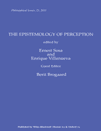
Philosophical Issues
Scope & Guideline
Exploring Contemporary Challenges in Philosophy
Introduction
Aims and Scopes
- Epistemic Normativity:
The journal emphasizes the exploration of epistemic normativity, examining how knowledge, belief, and rationality are governed by normative standards. This includes discussions on the foundations of epistemic practices and the implications of epistemic norms for understanding knowledge. - Moral Philosophy and Ethics:
A core area of interest is moral philosophy, particularly the nature of moral understanding, moral responsibility, and the interplay between emotions and ethical decision-making. This includes examining concepts like moral expertise and the impact of social contexts on moral judgments. - Agency and Responsibility:
The journal addresses themes surrounding agency, including discussions on free will, moral responsibility, and the philosophical implications of agency in social and political contexts. This involves an analysis of how agency is conceptualized within various philosophical frameworks. - Collective Knowledge and Epistemic Practices:
There is a significant focus on collective epistemology, exploring how groups form beliefs, make decisions, and share knowledge. This includes the study of epistemic injustice and the dynamics of group knowledge. - Interdisciplinary Approaches:
The journal integrates philosophical inquiry with insights from other disciplines, such as law, psychology, and social sciences, highlighting the relevance of philosophical issues in broader societal contexts.
Trending and Emerging
- Emotional Epistemology:
There has been a notable increase in papers exploring the role of emotions in epistemology, particularly how emotions influence beliefs and moral judgments. This theme is critical as it bridges the gap between cognitive and affective dimensions of human experience. - Non-Ideal Theories of Rationality:
Recent publications emphasize non-ideal epistemic rationality, focusing on how real-world limitations affect rational decision-making and belief formation. This trend acknowledges the complexities of human cognition and challenges traditional rationalist views. - Social and Collective Epistemology:
The exploration of collective knowledge and its implications for epistemic justice has gained traction. This emerging theme highlights the importance of social contexts in shaping knowledge practices and the ethical dimensions of collective belief systems. - Moral Understanding and Vision:
There is a growing interest in the concept of moral understanding as a form of 'moral vision,' suggesting a trend towards integrating perceptual and cognitive aspects of moral reasoning. This theme may reflect an increasing recognition of the complexities involved in moral cognition. - Doxastic Dilemmas and Epistemic Blame:
The investigation into doxastic dilemmas—situations where individuals face conflicting beliefs—and the associated concepts of epistemic blame is becoming more prominent. This reflects an interest in the responsibilities associated with belief formation and the moral implications of epistemic agency.
Declining or Waning
- Legal Epistemology:
Although legal epistemology was previously a significant theme, recent publications suggest a waning interest in this area. Discussions on the intersection of law and epistemology are appearing less frequently, possibly due to a shift towards more general philosophical inquiries rather than those specifically tied to legal contexts. - Statistical and Probabilistic Reasoning in Philosophy:
The emphasis on statistical evidence and Bayesian reasoning in philosophical discussions has decreased. This decline may indicate a movement away from quantitative approaches in favor of qualitative analyses of knowledge and belief. - Pragmatic Encroachment:
The discussions surrounding pragmatic encroachment in epistemology seem to have become less prominent. While initially a hot topic, the frequency of papers addressing this theme has diminished, suggesting a potential shift towards more foundational issues in epistemology.
Similar Journals

Teorema
Nurturing a community of philosophical excellence.Teorema is a distinguished academic journal within the realm of Philosophy, published by KRK EDICIONES in Spain. With an ISSN of 0210-1602, this journal has consistently contributed to the philosophical discourse since its inception in 2008, with a planned continuation until 2024. Recognized for its rigorous peer-review process and quality research, Teorema holds an esteemed position in the Scopus ranking, placed in the 57th percentile of Arts and Humanities philosophy journals, and categorized in Q3 for 2023. This journal serves as a platform for researchers, professionals, and students to engage with innovative philosophical ideas and debates, fostering a deeper understanding of key concepts and contemporary issues. While it does not offer open access to its content, Teorema remains an indispensable resource for those committed to the advancement of philosophical scholarship.
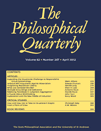
PHILOSOPHICAL QUARTERLY
Advancing the Frontiers of Philosophical ThoughtPHILOSOPHICAL QUARTERLY, a leading journal in the field of philosophy, is published by Oxford University Press, recognized for its commitment to advancing scholarly discourse since its inception in 1950. With an ISSN of 0031-8094 and an E-ISSN of 1467-9213, this prestigious journal is situated in the United Kingdom, reflecting a rich tradition of philosophical inquiry. The 2023 Category Quartiles rank it in the Q1 tier, demonstrating its substantial impact within the philosophy domain, supported by a Scopus rank of 130/806, placing it in the 83rd percentile of arts and humanities. While it does not currently offer open access, the journal remains a vital resource for researchers, professionals, and students seeking to engage with contemporary philosophical issues and theories. As it continues to publish insightful articles and critical discussions, the PHILOSOPHICAL QUARTERLY stands as a testament to the ongoing evolution and relevance of philosophical scholarship.
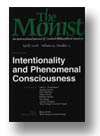
MONIST
Connecting Minds Through Philosophical DiscourseMONIST is a prestigious academic journal published by Oxford University Press Inc, focusing on the intricate dialogues within the field of Philosophy. With an impressive impact factor that places it in the Q1 quartile of its category for 2023, MONIST stands as a leader in promoting high-quality research that bridges various philosophical traditions and methodologies. Established in 1973, the journal has consistently contributed to contemporary discussions by providing a platform for diverse philosophical inquiries and fostering rigorous scholarly debate. Although available through subscription options, MONIST engages a wide audience, including researchers, educators, and students who are deeply invested in advancing philosophical thought. Its Scopus ranking showcases its significant influence in the Arts and Humanities, positioning it at rank 119 out of 806 in its field, symbolizing an 85th percentile standing. With a commitment to excellence and innovation in philosophical scholarship, MONIST continues to be an essential resource for those seeking to deepen their understanding of philosophical issues in a rapidly evolving intellectual landscape.
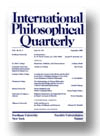
INTERNATIONAL PHILOSOPHICAL QUARTERLY
Illuminating the Landscape of Philosophical ThoughtINTERNATIONAL PHILOSOPHICAL QUARTERLY, published by the PHILOSOPHY DOCUMENTATION CENTER, stands as a vital resource for scholars and practitioners engaged in philosophical inquiry. With an ISSN of 0019-0365 and an E-ISSN of 2153-8077, this esteemed journal has published thought-provoking discussions and analyses in philosophy since its inception in 1974. The journal is housed in the United States at PO BOX 7147, CHARLOTTESVILLE, VA 22906-7147, and has shown a commitment to advancing philosophical debates across its converged years from 1974 to 2023. Recognized with a Q3 rating in the philosophy category for 2023, it ranks 511 out of 806 within Scopus, positioning it within the 36th percentile of its peers. Although not an open-access publication, it continues to offer critical insights that foster scholarly dialogue and research within the field. This journal is especially pertinent to researchers, professionals, and students who seek to deepen their understanding of contemporary philosophical issues and engage with a diverse array of philosophical perspectives.
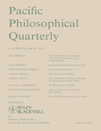
PACIFIC PHILOSOPHICAL QUARTERLY
Exploring the Depths of Contemporary ThoughtWelcome to the PACIFIC PHILOSOPHICAL QUARTERLY, a leading journal in the field of philosophy, published by Wiley. With an impressive impact factor and ranked in the top 15% of its category (Q1 in Philosophy), this esteemed journal has become a vital source for scholars and practitioners alike. Established in 1996, the journal presents groundbreaking articles that explore contemporary philosophical issues, ensuring its relevance through converged contributions up to 2024. With robust Scopus rankings, including a position of #122 out of 806 in the Arts and Humanities category, the quarterly serves as a platform for innovative ideas and rigorous debates in the philosophical community. Though it does not offer open access, its insights are invaluable for researchers, professionals, and students eager to deepen their understanding of philosophical discourse.

Acta Analytica-International Periodical for Philosophy in the Analytical Tradition
Unpacking complex ideas with clarity and precision.Acta Analytica is a premier international periodical dedicated to advancing the field of philosophy within the analytical tradition. Published by SPRINGER in the Netherlands, this journal has steadily established itself as a vital resource for scholars and practitioners, evidenced by its prestigious Q1 categorization in the 2023 Philosophy rankings and an impressive Scopus rank of #183 out of 806 in the Arts and Humanities category, placing it within the 77th percentile. With coverage spanning from 2009 to 2024, the journal encompasses a broad spectrum of philosophical discourse that fosters dialogue and encourages intellectual rigor among its contributors and readers alike. Although not an open-access journal, it ensures quality and accessibility to an audience passionate about the analytical approach to philosophical questions. Acta Analytica invites researchers, professionals, and students to engage with its rich and thought-provoking content, making it an essential addition to any philosophy-oriented collection.

Filosofia Unisinos
Cultivating Critical Conversations in PhilosophyFilosofia Unisinos, an esteemed journal in the field of Philosophy, is published by the Universidade do Vale do Rio dos Sinos (UNISINOS) in Brazil. Since its inception, the journal has embraced an Open Access approach, welcoming contributions from scholars globally. With its ISSN 1519-5023 and E-ISSN 1984-8234, it has positioned itself as a vital resource, showing consistent growth in academic circuit, reflected by its Q3 Quartile ranking in the 2023 Scopus category for Philosophy, indicating its relevance and contribution to the discipline. Covering a broad range of philosophical inquiries, from theoretical frameworks to contemporary interpretations, the journal offers a platform for rigorous scholarly dialogue and fosters innovative research. As it moves towards its convergence year in 2024, Filosofia Unisinos continues to be pivotal for researchers, professionals, and students interested in exploring the multifaceted landscape of philosophical thought.

Teoria-Rivista di Filosofia
Illuminating Contemporary Philosophical ChallengesTeoria-Rivista di Filosofia is a distinguished academic journal published by EDIZIONI ETS, based in Pisa, Italy. With a focus on philosophical discourse, this journal is a valuable resource for researchers, professionals, and students in the field of philosophy. Having achieved a commendable Q3 ranking in the 2023 category quartiles, Teoria stands out in the competitive landscape of philosophy journals, with a Scopus rank of #612 out of 806, placing it in the 24th percentile. Although currently classified as a non-open access publication, it frequently addresses cutting-edge themes and challenges within philosophical research, promoting rigorous analysis and diverse perspectives. The journal spans various topics across multiple issues from its inception in 2011 to its ongoing publications scheduled through 2024, making it a relevant venue for contemporary philosophical inquiry. The journal aims to foster scholarly communication and stimulate critical debates, contributing significantly to the global philosophical landscape.
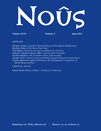
NOUS
Fostering a vibrant community of philosophical thinkers.NOUS is a prestigious academic journal published by WILEY, specializing in the field of Philosophy. Since its inception in 1989, it has maintained a strong reputation within the philosophical community, currently earning a remarkable position in the top quartile (Q1) of its category as of 2023. With an impressive Scopus ranking of #22 out of 806 in the Arts and Humanities – Philosophy category, and achieving a 97th percentile, NOUS serves as a pivotal platform for scholarly discourse, innovative research, and critical thinking. The journal prioritizes high-quality articles that contribute significantly to various philosophical debates, thereby attracting both established and emerging scholars. Although it does not offer an open access option, NOUS is a crucial resource for anyone engaged in serious philosophical inquiry and is dedicated to advancing knowledge and understanding in this rich field.
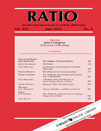
Ratio
Pioneering New Perspectives on Timeless IssuesRatio is a prestigious peer-reviewed journal published by WILEY, specializing in the field of Philosophy. Since its inception in 1988, Ratio has committed to advancing philosophical discourse, addressing contemporary issues, and exploring foundational questions that shape our understanding of the world. With an impressive impact factor and a 2023 classification as a Q1 journal in Philosophy, it holds a significant position in the academic community, ranked #207 out of 806 in the Arts and Humanities category according to Scopus, placing it in the 74th percentile. While primarily subscription-based, Ratio provides a platform for rigorous scholarship and intellectual exchange, inviting contributions from researchers, professionals, and students eager to engage with cutting-edge philosophical debates. The journal's continuous evolution through 2024 and beyond underscores its relevance and influence, making it a vital resource for anyone dedicated to the study of philosophy.